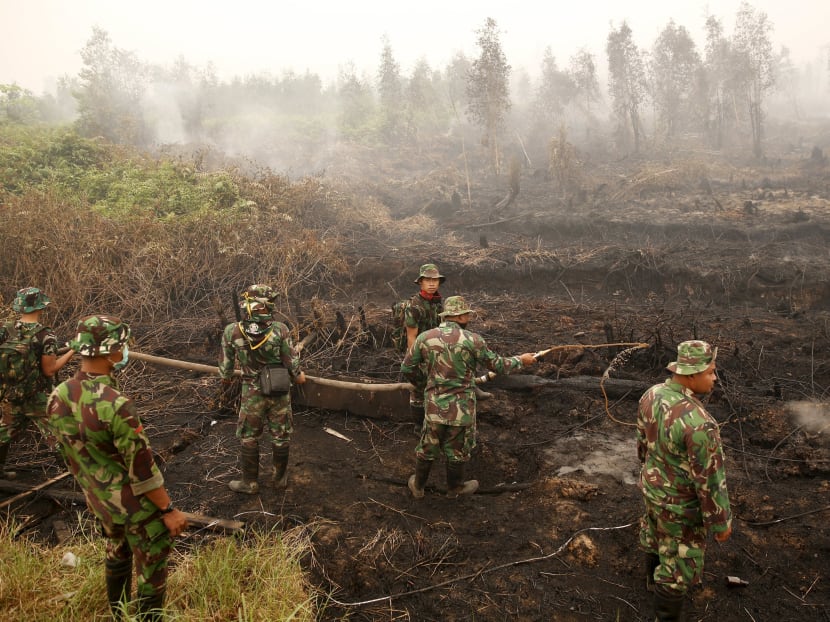Forecast error, lack of govt action fan Indonesia fire woes
JAKARTA — Indonesia’s weather agency failed to predict that the effects of the El Nino weather phenomenon this year would be worse than in 1997, a senior minister said today (Oct 28), as the government struggles to contain forest fires that have created a haze blanketing much of South-east Asia in recent months.

Indonesian soldiers spray water on a peat land fire near Palangkaraya, central Kalimantan, Indonesian October 28, 2015. Photo: Reuters
JAKARTA — Indonesia’s weather agency failed to predict that the effects of the El Nino weather phenomenon this year would be worse than in 1997, a senior minister said today (Oct 28), as the government struggles to contain forest fires that have created a haze blanketing much of South-east Asia in recent months.
“I must admit there was a mistake in the BMKG (state weather agency) forecast that didn’t predict El Nino this year would be worse than 1997,” said Mr Luhut Panjaitan, the Coordinating Security Minister tasked by President Joko Widodo with overseeing the government’s response to the crisis. “Our forecast was wrong.”
Often deliberately set by plantation companies and smallholders to clear land cheaply and quickly, the fires have been burning for weeks in the forests and carbon-rich peatlands of Sumatra and Kalimantan islands as the El Nino effects have exacerbated the dry season, making it harder to extinguish the fires. Recently, the fires have spread to far-flung places.
Mr Luhut today (Oct 28) said he has instructed government agencies to focus on cloud-seeding operations for the next four days, The Jakarta Post said. The national disaster management agency said it expected the fires to be completely extinguished by the end of next month or early December.
More than 43 million people have been exposed to smoke from the wildfires, with more than half a million cases of acute respiratory tract infections recorded, the Indonesian authorities have said.
Deaths from haze-related respiratory illnesses have reached 19 across Central Kalimantan, South Kalimantan, Jambi, South Sumatra and Riau, Social Affairs Minister Khofifah Indar Parawansa said today. All five provinces have declared a State of Emergency.
Indonesia has deployed warships to evacuate infants and other vulnerable residents in haze-hit areas, but the evacuations will be a last resort if the authorities are unable to provide care for those suffering from respiratory ailments.
An annual event, the haze crisis is particularly severe this year, even after Indonesia last year ratified an ASEAN regional agreement committing it to act to reduce the smoke haze caused by the land fires, as the law has yet to be enacted locally in its districts, said Dr Jonatan Anderias Lassa, a research fellow at the Centre for Non-Traditional Security Studies at the S Rajaratnam School of International Studies.
“They need to bring down that law into local legislative processes,” Dr Lassa told reporters on Monday, adding that a division of resources between central and local governments was also required and it might take up to 10 years to complete the whole implementation cycle.
When contacted by TODAY late yesterday, Dr Lassa explained that in order to fully implement the regional agreement, the first step was for Mr Widodo’s administration to issue a presidential decree laying out what should be done at the national level, followed by tasking the relevant ministries to work out the implementation details, including the technical guidelines.
This will then have to be localised by the provincial and district governments to work out the relevant laws and regulations on funding, manpower allocation, compliance and action plans in accordance with local conditions. However, no presidential decree has been issued by the government yet to kickstart the process.
Dr Lassa said that it is not clear which ministries will lead the effort, and it can take up to 10 years to complete the whole process based on the ratification of other agreements signed by Indonesia. Dr Lassa highlighted that although some companies have been brought before the police for interrogation, the investigation officers did not even know what relevant laws the companies were being investigated under.
He said: “They could not even answer a simple question from the company lawyers: What is illegal about burning your own field?”
He said what the Indonesian government has done so far is “just a show of force, but not solve the problem substantially from the legal angle”.
“All the 200 districts totally failed at the same time this year and they all did nothing. This is because there are no written local regulations and hence no incentive for them to act. This is a structural failure,” said Dr Lassa.
“This (starting from the issuance of a presidential decree) is a necessary step but it doesn’t guarantee results. But, if you do not even start this process, there will not be any results at all.” AGENCIES WITH ADDITIONAL REPORTING BY ALBERT WAI






